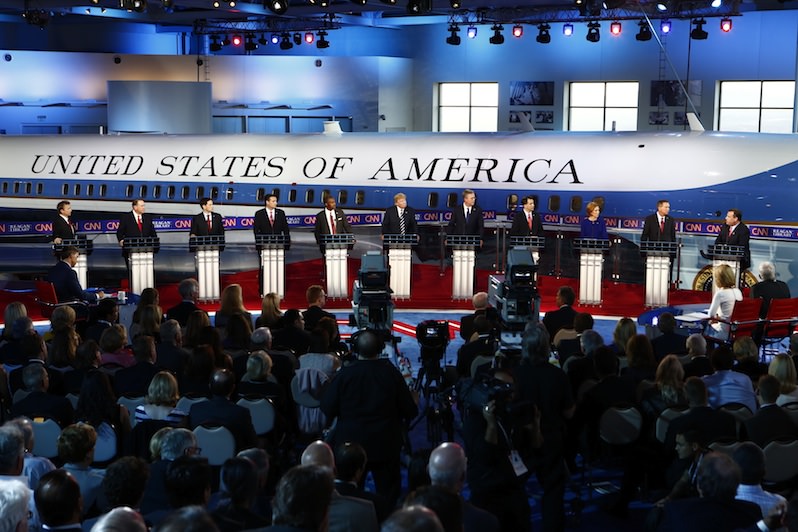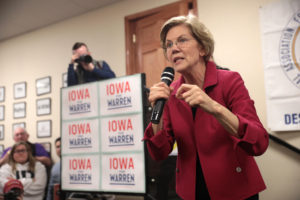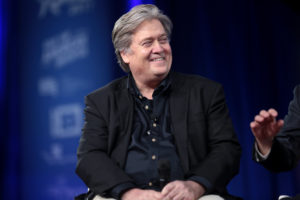Winners and Losers in the GOP Debate That Went On and On
This debate won't alarm Democratic strategists. The Republican infighting will make them happy, and so too will the portrait it painted of an extreme, angry party that is also -- Rubio and Bush excepted -- very pessimistic about the future of our nation. The top 11 GOP presidential candidates at the second Republican debate Wednesday. (CNN)
The top 11 GOP presidential candidates at the second Republican debate Wednesday. (CNN)
Wednesday’s Republican debate was long, very long. Its length may have altered its political impact.
WATCH: The CNN Republican Presidential Debate in 90 Seconds
Carly Fiorina was the big winner, especially in the first part of the debate. Her answers were crisp and she won game, set, match in the brief exchange about Donald Trump‘s boorish comments on her looks.
But she lost some ground as the debate wore on. The exchange with Trump over her stewardship of Hewlett-Packard went to Trump. Here, Chris Christie beat them both in what was his best moment. “Stop playing the games,” he said of their back-and-forth about their respective careers, saying they should speak instead to “the 55-year-old construction worker … who doesn’t have a job, who can’t fund his child’s education.” Christie showed how he had won in a Democratic state.
There was a harshness to Fiorina’s attacks on liberals and the left, although this probably didn’t bother conservatives. She was a net winner, but not by the margin she built up at the start. And in opening up her business record, Trump may have created future problems for her.
Ben Carson did not entirely disappear, but he came close at times. You would think this hurt him, but a similar performance in the first debate actually kicked off his ascent in the polls. A hunch: Fiorina may pick up some of Carson’s support, and some from the non-Trump, non-Carson crowd.
Jeb Bush had a complicated debate, sometimes looking beleaguered, sometimes on offense. He did well defending immigration and (for a Republican audience) defending his brother. He opened up a fascinating line of continuing inquiry by saying that Trump lobbied him to legalize gambling in Florida; there will be a lot of reporting on this. Bush got plenty of time and scored well enough that he may pick up at least a few points in the polls. But he will lose in comparisons with Fiorina, who was tougher on Trump.
Scott Walker needed to do the most, and he didn’t do it. Marco Rubio had some strong moments, especially toward the marathon’s end. Rand Paul was best when he repaired to libertarian purity on drug legalization and war. This may win back some of his father’s partisans who thought the son had strayed from the true faith. Christie gained some ground, and seemed thoroughly comfortable with himself. Mike Huckabee was not a big factor. John Kasich reinforced his brand as the reasonable, amiable alternative. He probably strengthened himself most with the non-Republicans watching. Ted Cruz played to type as the purest conservative. He at least held his own — and may pick up a bit if Trump starts losing support. In the undercard debate, Lindsey Graham was dominant, and distinctive: humane on immigration, a super hawk on foreign policy, and often funny. He might sneak into the top tier.
Yes, I left Trump for last because his situation is confusing, at least to me. He was not dominant. Fiorina got to him, and while Trump won some of his exchanges with Bush, he lost some, too. He avoided severe damage on foreign policy, a win for him. There will be no new Trump surge, but I am not persuaded that he lost as much ground as some of my pundit colleagues seem to think. The debate suggested that as the Trump phenomenon is normalized, it will become less interesting.
The first Republican debate captured the public imagination. This one seemed to drone on, and the Republicans said little (and weren’t asked much) about issues that will affect middle-class and working-class swing voters. The exceptional moments were Christie’s intervention in the Trump-Fiorina exchange and Trump’s remarkable — and I thought effective — defense of progressive taxes. The Club for Growth, the tax-cuts-above-all group that has been running ads against Trump, will no doubt double down. Otherwise, Wednesday gave us old, tired GOP economics.
Whether out of political need or genuine conviction, Republicans take very hard-line foreign policy positions that are well to the right of where a majority of the country is. Here, Kasich — who had the nerve to say the U.S. needs allies — may be closer to the dominant mood. But he has to get through the primaries. Fiorina, the unapologetic hawk, is closer to the Republican heart.
This debate won’t alarm Democratic strategists. The Republican infighting will make them happy, and so, too, will the portrait it painted of an extreme, angry party that is also — Rubio and Bush are exceptions — very pessimistic about the future of our nation.
E.J. Dionne’s email address is [email protected]. Twitter: @EJDionne.
© 2015, Washington Post Writers Group
Your support matters…Independent journalism is under threat and overshadowed by heavily funded mainstream media.
You can help level the playing field. Become a member.
Your tax-deductible contribution keeps us digging beneath the headlines to give you thought-provoking, investigative reporting and analysis that unearths what's really happening- without compromise.
Give today to support our courageous, independent journalists.






You need to be a supporter to comment.
There are currently no responses to this article.
Be the first to respond.